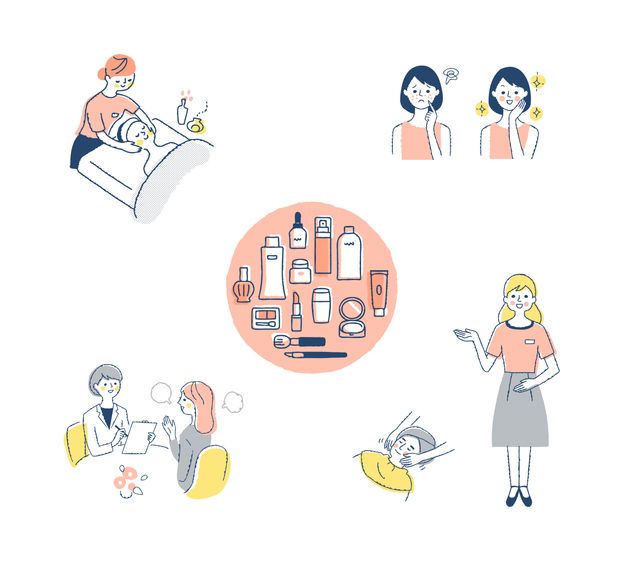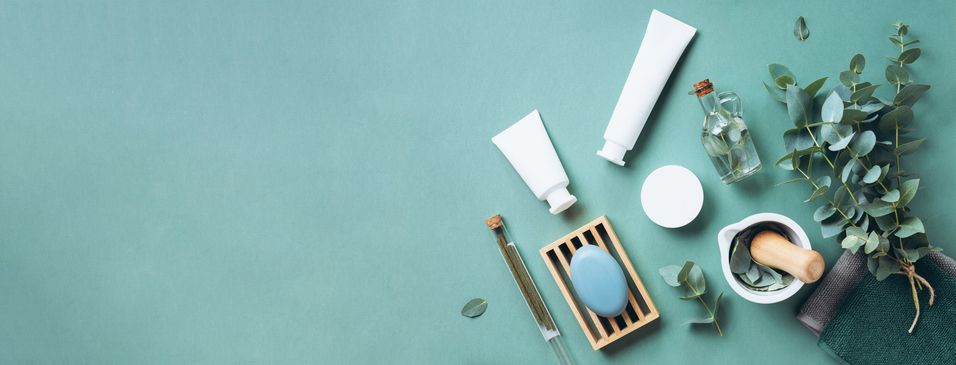Author: Leila Tan|Updated: 27 June 2025
Are you sick of having to deal with annoying spots and acne that just won't go away? If you're like most people, you've probably tried every spot treatment in the book, but not all of them work. In this detailed guide, we'll look at the best spot treatments that have been shown to work for different types of skin, including natural remedies, over-the-counter choices, and prescription drugs.

Understanding on Spots and Acne Breakouts

Before we talk about the best spot treatments, it's important to know what causes pimples and other skin problems. Blemishes can be caused by many things, like hormonal imbalances, genetics, a bad diet, stress, or not taking care of your face well. On the other hand, acne is caused by too much oil and closed pores, which can let bacteria grow and make the skin red and swollen. As you can see about the general explanation above, it's easy to tell that acne and blemishes are two different skin problems. Here's how you can tell them apart.
Blemishes
Blemishes are any mark, spot, change in colour, or flaw that shows up on the skin. Blemishes can be caused by things like sun damage, getting older, changes in hormones, or scars. Freckles, age spots, discoloration, and birthmarks are all kinds of flaws. Most spots are safe and don't put your health at risk.
Acne
Acne is a type of skin problem that happens when dead skin cells, bacteria, and too much oil block the pores. Acne can show up as whiteheads, blackheads, papules, pustules, lumps, and cysts. Acne can make the face swell, get infected, and leave scars. Teenagers and young adults are more likely to get acne, but anyone can get it at any age.
The main difference between blemishes and acne is that acne is a disease or problem of the skin, while blemishes are a condition or symptom of the skin. Acne can be thought of as a condition that causes certain kinds of spots, but not all blemishes are acne. A person can have scars or age spots, for example, without having acne.
What form or packaging are they usually in?
Acne spot treatment items are made to target and lessen the look of specific skin problems. They usually come in the form of creams, gels, lotions, or patches with active ingredients like salicylic acid, retinoids, aloe vera, or benzoyl peroxide. These ingredients work by killing germs, clearing out clogged pores, reducing inflammation, or fading scars.
However, acne spot treatments work best for acne that is mild to moderate and has papules and pustules, which are inflamed pimples. They don't work very well for cystic acne, which needs to be treated orally or by a professional. Acne spot treatments should only be used on the affected area after the skin has been cleaned and moisturised.

Spot Treatments You Can Buy at the Store

After knowing what kind of skin issues you are facing, spot solutions that you can buy over-the-counter (OTC) are another great way to get rid of blemishes and acne. Here are some of the best spot treatments ingredients you can often find people searching for:
Salicylic acid
Salicylic acid is a beta-hydroxy acid that helps remove dead skin cells and clear out pores. It can also help reduce heat and swelling because it can stop inflammation. Try to find treatments that have 2% salicylic acid in them.
Benzoyl peroxide
Benzoyl peroxide is an antibiotic that can kill the bacteria that cause acne. It can also help reduce heat and swelling because it can stop inflammation. Look for spot solutions that have between 2.5% and 10% benzoyl peroxide.
Retinoids
Retinoids are made from vitamin A and can help clear pores and speed up the turnover of skin cells. They can also help reduce redness and swelling because they have qualities that stop inflammation. Look for spot treatments with tretinoin or adapalene.
Read More
Book Now to Experience
Acne Treatment
1 Minute Self-Registration
Date should not be before minimal date

How to Get Rid of Blemishes and Acne with Natural Remedies
However, these ingredients mentioned above can be too strong for people that have sensitive skin. Thus, if you fall into the category of having sensitive skin, natural treatments can be a great way to get rid of blemishes and acne. Here are some of the most effective herbal remedies:
Tea tree oil
Tea tree oil is a natural antiseptic that can help reduce blemish-related pain and redness. Use a cotton swab to dab a small amount of tea tree oil on the affected area.
Aloe vera
Aloe vera has traits that can help soothe and calm skin that is irritated. Fresh aloe vera gel should be put directly on the wound and left on for 20 minutes before being washed off.
Honey
Honey can help kill the bacteria that cause acne because it has antibacterial qualities. Apply a small amount of honey straight to the area and leave it on for 15 to 20 minutes before washing it off.

Get Spot Treatment at Home Right with the Correct Steps
For those who are totally new or first few times trying to do spot treatment, follow these steps to ensure your spot treatment works like a charm!
1. Use a soft cleanser to wash your face and pat it dry with a clean towel.
2. Use a cotton swab or your finger to put a small layer of spot treatment on the spot that needs it. Try not to rub or spread the powder on the skin around it.
3. Wait until the spot treatment is fully dry before using any other skin care or makeup products.
4. Do it twice a day, in the morning and at night, until the spot is gone.
Note
- Stay away from things like booze, menthol, and perfume that can irritate or dry out your skin.
- After using a spot treatment, use a moisturiser to keep your face hydrated and in balance.
- Do not pick at or pop your pimples because this can make the infection worse and cause more redness and scars.
- Before using a new spot treatment, you should do a patch test to see if your skin is sensitive or allergic to it.
Book Now to Experience
Acne Treatment
1 Minute Self-Registration
Date should not be before minimal date

Pros And Cons of Spot Treatment
Spot treatment is a way to treat acne by putting medicine on the spot that needs it instead of on the whole face or body. It can help people who get a few pimples or odd breakouts because it can reduce inflammation and speed up the healing process. But spot treatment has some downsides that you should think about before you use it.
Some benefits of spot treatment include:
- It can target specific spots and stop them from getting worse or spreading.
- It can save time and money because less product needs to be bought and used.
- Since the rest of the skin is not exposed to strong chemicals, irritation and dryness are less likely to happen.
- It can work well with other skin care items, like moisturisers and sunscreen.
A few problems with spot treatment are:
- It might not work for severe or long-lasting acne because it doesn't treat the reasons of acne, like hormones, bacteria, or clogged pores.
- It could change the colour of the skin or leave scars, especially if the medicine is too strong or is used too often.
- If the spot isn't cleaned properly before the medicine is put on it, the chance of getting an illness or inflammation goes up.
- It might make it hard to put on makeup because some products might flake off or change colour.
Some people with mild to moderate acne may find that spot treatment helps, but it is not a cure-all. Spot treatments should be used along with a gentle, consistent skin care procedure that cleans, hydrates, and protects the skin.

Here's How New Beauty Can Help You Banish Acne
Given that spot treatment is not a cure to all the issues you are facing on the skin, New Beauty has a popular treatment that may be able to answer your prayers. A person's self-esteem can be hurt by acne scars, acne, pimples, whiteheads, and blackheads. Acne treatments have come a long way. There are now creams, chemical peels, pills, and other ways to treat acne, but not all of them work for a long time.
The Acne Treatment is a new solution for acne-prone skin from New Beauty. The Acne Treatment does not involve surgery, cuts, injections, acne medicine, or medicines taken by mouth. Most people with mild to severe acne who go to a beautician are good candidates for this treatment.
First, the dual spiral suction + drainage technology removes dead skin cells and opens up pores at the same time. This calms inflammation and infection caused by acne. Next, a hydrating serum is injected into the face to keep sebum production in check and encourage collagen production. Without too much oil, acne is less likely to come back. The Acne Treatment works on acne, blemishes, blackheads, whiteheads, pockmarks, swollen pores, dry skin, acne scars, and a dull skin tone. Take this chance to make your face look better and feel better about yourself.
New Beauty's Acne TreatmentBook Now to Experience
Acne Treatment
1 Minute Self-Registration
Date should not be before minimal date

Refusing Spot Treatment or Professional Treatment? What Happen If You Leave Them As It Is
Acne can affect both a person's physical and mental health in bad ways. Some of the bad things that could happen if you have really bad acne are:
Scarring
Severe acne can damage the skin and leave permanent scars that can affect a person's look and self-esteem. Scars can be hard to get rid of, and you may need medical help like laser treatment, chemical peels, or dermabrasion.
Infection
Bacteria can get into the skin through open cuts or swollen pores and cause acne to get infected. An infection can cause pain, fever, redness, pus, or all of these things. Infections can sometimes spread to other parts of the body and lead to major problems like sepsis or cellulitis.
Acne can affect a person's mood and mental health, which can lead to depression. Because of their skin disease, people with acne may feel embarrassed, ashamed, anxious, or alone. People who rate them based on how they look may also give them a bad name, treat them badly, or pick on them. These things can lead to low self-esteem, a bad view of oneself, and sadness.
Acne is not life-threatening, but it can have a big effect on a person's well-being and quality of life. Because of this, it is important to see a doctor if acne is serious or keeps coming back.

Medication By Prescription for Blemishes and Acne
If you have really serious acne problems plus side effects that even professional treatment can't solve, it is best for you to consult your doctor. Here are some of the most commonly used medicinal drugs to treat blemishes and acne:
Oral antibiotics
Antibiotics that you take by mouth, like tetracycline, can help kill the bacteria that cause acne and lessen inflammation. They are usually given to people with mild to severe acne.
Topical antibiotics
Antibiotics that are put on the skin, like clindamycin, can kill the bacteria that cause acne and lessen inflammation. Most of the time, they are given to people with mild to severe acne.

Conclusion
It is vital to your health and appearance that you take care of your skin and eliminate acne and blemishes. Additionally, you should avoid touching, picking, and scratching your skin, as doing so can aggravate the condition and disseminate bacteria. By adhering to a good skin care regimen and, if necessary, seeking professional assistance like treatment or even specialist, you can improve your skin condition and increase your confidence!
Book Now to Experience
Acne Treatment
1 Minute Self-Registration
Date should not be before minimal date
FAQ
1. Can acne be caused by food?
There is no solid proof that any one food causes or makes acne worse. But some people may find that certain things cause their breakouts or make them worse. Some of these foods are dairy, processed carbs, sugar, chocolate, and spicy foods. If you find that certain foods make your acne worse, you might want to cut back or stop eating them to see if your skin gets better. But don't give up any food group until you've talked to your doctor or a chef. Don't forget that a spot treatment can't replace a good skin care practise. Still, you should wash, moisturise, and protect your face every day. You may also want to use toners, serums, masks, peels, and other products that can help avoid and treat acne.
2. Does spot treatment work in the long run?
Spot treatments can help with mild to serious cases of acne, scarring, or discoloration. But spot treatment is not a long-term way to keep these conditions from coming back or getting worse. Spot treatment only fixes the problems that are already there. It doesn't deal with the reasons or factors that led to them. Spot treatment, for example, doesn't control hormone levels, lower stress, improve diet, or protect against sun damage. So, spot treatment should be part of a larger plan that includes a good skin care routine, changes to your lifestyle, and regular visits to a dermatologist or a beauty doctor.
3. How often should I fix spots?
How often you treat a spot varies on the product or procedure you're using and the condition you're trying to treat. In general, you should follow the directions on the product's package or what your doctor tells you. Some items can be used every day or twice a day, while others can only be used once a week or as needed. Some procedures can be done once a month or once every few months. Others, on the other hand, can be done more or less often, based on your skin type and how well they work for you. You should also pay attention to how your skin reacts and make changes as needed.
4. What are some things that could go wrong with spot treatment?
Depending on the product or method you use and how sensitive your skin is, spot treatment could have some side effects. Redness, inflammation, dryness, peeling, flaking, burning, itching, or stinging are just some of the most common side effects. Most of the time, these side effects are light and temporary, and they can be lessened by using gentle cleansers and moisturisers and staying out of the sun too much. But some rare but dangerous side effects include allergic reactions, infections, scarring, hyperpigmentation (darkening), or hypopigmentation (lightening). These side effects need to be treated right away by a doctor and may need more care.
5. Where in Singapore can I get a spot treated?
You can use over-the-counter products that are right for your skin type and state to treat spots at home. But if you have severe or persistent acne, pigmentation, or scarring that doesn't get better with home remedies or products, you may need to see a dermatologist or an aesthetic doctor for help and treatment. In Singapore, there are many places that offer different kinds of spot treatments, such as lasers, chemical peels, microdermabrasion, and microneedling.
Recommended Articles
COPYRIGHT© NEW BEAUTY MANAGEMENT LIMITED 2026. ALL RIGHT RESERVED.




